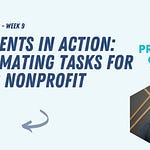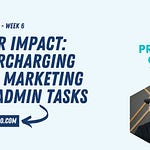Welcome back, nonprofit professionals! Last week, we dove into prompt engineering – learning how to craft effective questions and instructions that get AI to produce truly useful results. I talked about creating complex, multi-step prompts and even getting AI to ask you clarifying questions to improve its understanding.
This week, I'm going to transform those individual prompts into a true AI power-up: your own reusable prompt library. Think of it like building a toolkit of your best questions, ready to deploy whenever you need them.
Why Create a Prompt Library for Your Nonprofit
Efficiency and Time-Saving: How much time do you spend drafting emails, social media posts, or meeting summaries? With a prompt library, you no longer have to start from scratch. Just grab a pre-made prompt, drop in your specific details, and let AI do the heavy lifting. This frees up precious time for higher-level strategic work.
Consistency and Quality: Whether it's donor communications or internal reports, maintaining a consistent voice and quality is crucial. Reusable prompts help ensure that your AI outputs maintain a consistent tone, style, and accuracy across different projects and even when different team members are using AI.
Knowledge Sharing: Imagine onboarding a new team member and instantly providing them with a proven set of prompts for their daily tasks. A prompt library becomes a shared resource, fostering best practices and ensuring everyone gets the most out of your AI tools.
Reducing "Blank Page Syndrome": We've all been there – staring at a blank screen, unsure how to begin. A prompt library banishes that feeling. When you know you have a collection of effective prompts at your fingertips, you can overcome that initial hurdle and start generating content quickly and confidently.
Leverage AI to Build Better Prompts
It might sound a bit meta, but you can actually use AI to help you create better prompts for AI! This is where the iterative power of these tools truly shines.
Here's how you can do it:
Refining Existing Prompts: Have a prompt that's almost perfect but needs a tweak? Give it to AI and ask for improvements. For instance, you could say: "I have this prompt: 'Write a social media post about our fundraiser.' How can I make it more specific for our Instagram audience, and include a call to action for ticket sales?" AI can then offer suggestions to make your prompt more targeted and effective.
Generating Prompt Ideas: Stuck on how to even start a prompt for a new task? Just ask AI for ideas! Try something like: "Help me create an AI prompt for drafting a thank-you letter to a first-time donor." AI can suggest key elements to include, such as the donor's name, the impact of their donation, and a call to continued engagement.
Expanding on Core Ideas: If you have a basic concept for a prompt, AI can help you flesh it out. For example, you might say: "I want a prompt for summarizing meeting notes. What details should I include to ensure the summary is useful for a nonprofit team?" AI can suggest adding elements like attendee names, key decisions, action items, and assigned roles.
By using AI to refine your prompts, you're not just getting better outputs; you're also learning how to think more strategically about your interactions with AI.
10 AI Prompts to Supercharge Your Nonprofit
To get you started, here's a collection of 10 prompts specifically designed for common nonprofit tasks. These are your "nonprofit-ready" prompts, built to help you tackle everything from internal communications to donor outreach. This is the short version of each of these prompts. For the full version and to download my “10 AI Prompts to Supercharge Your Nonprofit” PDF, visit TheGoodCollective.US and look in the AI Tools area.
Meeting Recap Prompt:
Prompt: "You are a nonprofit team lead. Use the notes below to generate a meeting summary, list the 3 most important decisions, and suggest next steps with assigned roles."
Use: Quickly summarize team meetings, board meetings, or volunteer briefings, ensuring everyone is clear on outcomes and responsibilities.
Meeting Preparation Prompt:
Prompt: "Act as an operations manager. I have a [type] meeting coming up. Suggest a 5-point agenda based on this goal: [insert goal]. Then list any prep work I should do."
Use: Streamline meeting planning, ensuring discussions are focused and productive.
Marketing Messaging Improvement Prompt:
Prompt: "You are a nonprofit brand strategist. Here’s our current message: [insert copy]. Improve it to be clearer, more emotional, and aligned with our mission to [insert]. Suggest 2 alternative versions."
Use: Enhance fundraising appeals, website copy, or campaign slogans to resonate more deeply with your audience.
Social Media Hook Generator:
Prompt: "Act as a social media strategist. I want to post about [topic]. Give me 5 short hooks that will grab attention and encourage people to read more."
Use: Create engaging introductions for social media posts across various platforms, increasing engagement.
Social Media Post Generator:
Prompt: "You are a communications coordinator. Write a social media post about [event/topic]. Audience: [e.g., volunteers, donors]. Tone: [e.g., warm, excited]. Include a call to action."
Use: Draft posts quickly for events, impact stories, or urgent appeals, tailored to your specific audience and desired tone.
Goal Setting Prompt:
Prompt: "Act as a coach for nonprofit leaders. Help me turn this vague goal — [insert goal] — into a SMART goal. Then suggest one small next step I can take this week."
Use: Define clear, measurable, achievable, relevant, and time-bound (SMART) goals for projects, programs, or even personal professional development.
Copy Editing and Proofing Prompt:
Prompt: "You are a professional editor. Please review this text for clarity, grammar, and tone. Suggest edits and explain any major changes."
Use: Ensure all written communications, from emails to reports, are polished, professional, and free of errors.
Writing Analyzer and Improver Prompt:
Prompt: "Act as a writing coach. Review this text and identify: 1) the main idea, 2) areas that need clarity, and 3) ways to make it more engaging."
Use: Get valuable feedback on longer-form content like blog posts, articles, or internal documents to improve their overall impact.
Grant Submission Draft Writer:
Prompt: "You are a grant writer for a small nonprofit. Draft a first paragraph for a grant proposal focused on [project or need]. Use an emotional, compelling tone and include 1 key stat from this summary: [insert]."
Use: Kickstart your grant applications with strong, impactful opening statements that capture the funder's attention.
Email Automation Series for New Donors:
Prompt: "Act as an email marketing strategist. Write a 3-part email series to welcome new donors. Each email should have a theme (e.g., welcome, impact, invitation) and a clear call to action."
Use: Develop automated email sequences to nurture relationships with new supporters, keeping them engaged and informed about your mission.
Important Reminder: While these prompts are powerful tools, always remember that AI outputs are a starting point. Critical review and adaptation are always necessary to ensure accuracy, maintain your nonprofit's unique voice, and align with your specific mission. You are the expert, and AI is your assistant.
Tools to Organize: Building Your Own Prompt Library
Having great prompts is one thing; keeping them organized and accessible is another. While you could technically keep them in a simple document, using a digital tool will make your prompt library much more powerful and easy to use.
Simple options include:
Google Docs or Microsoft Word: Create a document, categorize your prompts with headings, and use the search function.
Spreadsheets (Google Sheets, Excel): You could list prompts, their categories, and use cases in columns.
Dedicated Note-Taking Apps (Evernote, OneNote): These offer tagging and robust search features.
However, for a truly dynamic and easily searchable prompt library, I highly recommend a tool like Notion. Notion is incredibly flexible and allows you to create structured databases that can serve as excellent prompt libraries.
If you haven’t aready, make sure to watch the video for this Lesson to see how to set up your AI Prompt Library in Notion.
Your Challenge and Next Steps
Now it's your turn to put this into practice!
Challenge: Your task for this week is to create 3 reusable prompts for your daily work and share them on TheGoodCollective.US (supported by my friends at Green Mellen).
Think about the tasks you do most often – writing thank-you notes, drafting event descriptions, or summarizing reports. Craft prompts that you know you'll use repeatedly. Sharing them on TheGoodCollective.US will not only help your peers but also solidify your own understanding and give you valuable feedback.
Take a few minutes to brainstorm which of your daily tasks could be made easier with a well-crafted, reusable AI prompt.
I encourage you to experiment, adapt, and build out your prompt library. The more you use it, the more valuable it will become.








